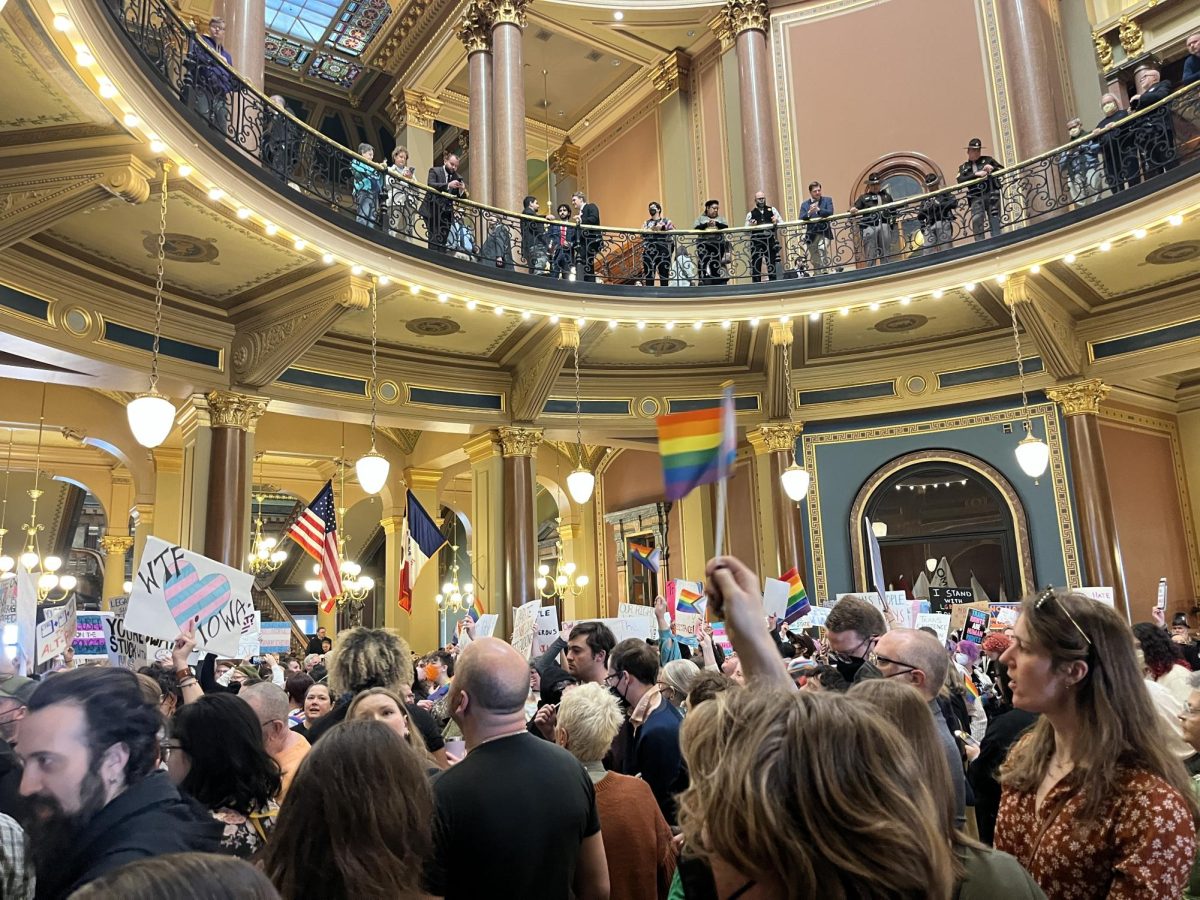Iowa Governor Kim Reynolds signed SF 418 on Feb. 28, effectively ending civil rights protections for transgender and nonbinary Iowans. The state is the first to remove established civil rights protections for transgender and nonbinary people.
This law, which goes into effect on July 1, takes the term “gender identity” out of Iowa civil rights codes. Iowans are still protected against discrimination based on their assigned sex at birth, either male or female, but are no longer protected from discrimination based on their gender identity if it doesn’t align with their sex assigned at birth.
“It is common sense to acknowledge the obvious biological differences between men and women. In fact, it is necessary to secure genuine equal protection for women and girls,” Reynolds said in her statement on Feb. 28.
Reynolds also said that previously, the lines between the sexes were blurred by Iowa civil rights codes and taxpayers were forced to pay for gender reassignment surgeries. She said that the bill aligns the state with federal law, and the laws that most other states have. Additionally, Reynolds said that every Iowan, without exception, deserves respect and dignity and that the bill will protect women and girls. View Reynolds’ whole statement below.
Today, I signed into law a bill that safeguards the rights of women and girls. pic.twitter.com/bjEEsAW6aR
— Gov. Kim Reynolds (@IAGovernor) February 28, 2025
Iowa legislators fast-tracked the bill, meaning it went through both the House and the Senate at the same time, limiting the number of public hearings while the bill was in subcommittee. When fast-tracking a bill, legislators will try to ensure that the language in the bills is the same to avoid having to go through a chamber again for another vote.
The bill passed the Senate 33-15 and the House 60-39 on Feb. 27. The vote was not entirely along party lines — some Republicans voted against the bill — but some faced skepticism for how hard they fought. David Jacoby, D-Coralville, was one of these skeptics, saying he wished Republican legislators fought harder against the bill.
“There were a handful of Republicans — four or five that voted against it, but there was, 10 or 12 who were fighting the bill — but they, how would I say it politely, proved not to have any spine…And even the ones that voted against it didn’t try very hard to defeat the defeat the bill,” Jacoby said.
Iowa civil rights law protects against discrimination in areas like employment, buying a home, getting a credit card or loans and other essential areas of life. Removing gender identity from these codes means that people can be discriminated against if they are, or are suspected to be, transgender.
The law also requires Iowans to have birth certificates that reflect sex assigned at birth and strikes the provision allowing changing sex markers after a sex change that has been confirmed by a medical professional. The law will ban “gender theory instruction” in grades K-6.
Jacoby said that there’s a lot up in the air when it comes to how the bill will be enforced because what is encoded in federal law is not necessarily what is enforced.
“I think, any level of civil rights from 1965 through now will not be enforced…it’s a big difference between what’s literally on the books and what will be enforced,” he said.
Gender identity was added to Iowa civil rights law in July of 2007, along with sexual orientation. This was two years before gay marriage was legalized in Iowa and eight years before it was nationally legalized in the United States. Jacoby was in office back in 2007 when it was added and said it was frustrating to see a bill like SF 418 pass.
The bill was met by protest in the community, with over 2,500 Iowans flooding the capitol on Thursday, speaking at committee hearings and leaving public comments in protest of the bill. Over 95% of the comments left on the bill were in opposition and can be viewed here.
West High senior Ro James, who is a trans man, went to the Capitol on Monday and Thursday to protest the bill. He described the protest on Monday as being more unorganized but was about being present at the Capitol more than anything else. Thursday was different: “That turn [out] was beautiful. I was really, really happy with showing up to the capitol and then having to wait in line to even get inside, [the line was] around the building,” James said.
James stood with the protestors outside of the hearing in the Capitol’s rotunda while the public hearing was happening. He said the protestors listened in on their phones and cheered when people were speaking against the bill, even though they weren’t allowed inside the room.
Also present at the protest was Iowa City Mayor Bruce Teague. During the protest, Teague stood in the middle of the Capitol’s rotunda and started singing — and people listened and joined in.
“Leading a crowd of 2,500 people in the song “Singing for Our Lives” was a moment of unity and strength, one that reminded me of the power we have when we stand together for justice. There was a real sense of solidarity in the air, a determination to protect the rights and dignity of all Iowans, especially as the legislation was voting to remove transgender rights from our state’s civil rights protections,” Teague said.
That moment was emotional for James as well; to him, it felt like something beautiful happening in the midst of something terrible.
“People start singing, and it’s beautiful, and I can’t even understand what they’re saying. It felt like a blur, almost,” James said. “I [looked] up into the dome of the Capitol, and it [said], ‘for the people, by the people’. I remember being so angry, because clearly, no, it’s not…clearly Iowans don’t want this.”
That feeling was there as well when the bill passed that evening.
“It genuinely is crazy, especially there in the moment, you’re so angry, but you’re so happy at the same time because all these people [are] backing you [and] standing with you,” James said.
James said he was fortunate to live and work in a supportive environment, but he fears for other trans Iowans who don’t have the same saying his “heart breaks for them.”
“At the protest we met this group of people who had already been kicked out, already been evicted, already been fired, already been homeless, like three times,” James said. “And these senators, they don’t care…when we were talking them, [we said], ‘people are going to be really affected by this. People are going to get thrown out, people are going to die.’ And he was like, ‘Well, I sure hope that doesn’t happen.’”
The protest isn’t where the pushback stops. In the coming months, it is likely that the bill will face lawsuits and other challenges.
“This decision deeply impacts a vulnerable part of our community, and I felt the weight of that while standing with those advocating for equality. It’s critical that we continue to raise our voices and push for legislation that ensures fairness and safety for everyone, regardless of their gender identity,” Teague said.
Subscribe to our newsletter!
"*" indicates required fields















